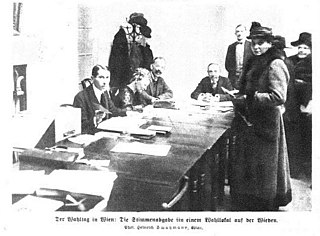Related Research Articles

Emmeline Pankhurst was a British political activist who organised the British suffragette movement and helped women to win in 1918 the right to vote in Great Britain and Ireland. In 1999, Time named her as one of the 100 Most Important People of the 20th Century, stating that "she shaped an idea of objects for our time" and "shook society into a new pattern from which there could be no going back". She was widely criticised for her militant tactics, and historians disagree about their effectiveness, but her work is recognised as a crucial element in achieving women's suffrage in the United Kingdom.

The Women's Social and Political Union (WSPU) was a women-only political movement and leading militant organisation campaigning for women's suffrage in the United Kingdom founded in 1903. Known from 1906 as the suffragettes, its membership and policies were tightly controlled by Emmeline Pankhurst and her daughters Christabel and Sylvia. Sylvia was eventually expelled.
The National Union of Women Suffrage Societies (NUWSS), also known as the suffragists was an organisation founded in 1897 of women's suffrage societies around the United Kingdom. In 1919 it was renamed the National Union of Societies for Equal Citizenship.

The Women's Freedom League was an organisation in the United Kingdom from 1907 to 1961 which campaigned for women's suffrage, pacifism and sexual equality. It was founded by former members of the Women's Social and Political Union after the Pankhursts decided to rule without democratic support from their members.

A movement to fight for women's right to vote in the United Kingdom finally succeeded through acts of Parliament in 1918 and 1928. It became a national movement in the Victorian era. Women were not explicitly banned from voting in Great Britain until the Reform Act 1832 and the Municipal Corporations Act 1835. In 1872 the fight for women's suffrage became a national movement with the formation of the National Society for Women's Suffrage and later the more influential National Union of Women's Suffrage Societies (NUWSS). As well as in England, women's suffrage movements in Wales, Scotland and other parts of the United Kingdom gained momentum. The movements shifted sentiments in favour of woman suffrage by 1906. It was at this point that the militant campaign began with the formation of the Women's Social and Political Union (WSPU).
The Conservative and Unionist Women's Franchise Association (CUWFA) was a British women's suffrage organisation open to members of the Conservative and Unionist Party. Formed in 1908 by members of the National Union of Women's Suffrage Societies, CUWFA was the third-largest suffrage organisation in Britain before the First World War.

The Irish Women's Franchise League was an organisation for women's suffrage which was set up in Dublin in November 1908. Its founder members included Hanna Sheehy-Skeffington, Margaret Cousins, Francis Sheehy-Skeffington and James H. Cousins. Thomas MacDonagh was a member.
The Dublin Women's Suffrage Association (DSWA), later the Irish Women's Suffrage and Local Government Association (IWSLGA), was a women's suffrage organisation based in Dublin from 1876 to 1919, latterly also campaigning for a greater role for women in local government and public affairs.

The Church League for Women's Suffrage (CLWS) was an organisation campaigning for women's suffrage in the United Kingdom. The league was started in London, but by 1913 it had branches across England, in Wales and Scotland and Ireland.

Helen Miller Fraser, later Moyes, was a Scottish suffragist, feminist, educationalist and Liberal Party politician who later emigrated to Australia.
The Edinburgh National Society for Women's Suffrage was a leading group for women's rights in Scotland. It was one of the first three suffrage societies to be formed in Britain.
The United Suffragists was a women's suffrage movement in the United Kingdom.

Women's suffrage in Wales has historically been marginalised due to the prominence of societies and political groups in England which led the reform for women throughout the United Kingdom. Due to differing social structures and a heavily industrialised working-class society, the growth of a national movement in Wales grew but then stuttered in the late nineteenth century in comparison with that of England. Nevertheless, distinct Welsh groups and individuals rose to prominence and were vocal in the rise of suffrage in Wales and the rest of Great Britain.

The Suffrage Oak is a Hungarian oak tree in Kelvingrove Park in Glasgow, planted in 1918 by a number of female suffrage organisations to commemorate the passing on the Representation of the People Act in 1918. A plaque was added in 1995 by the Women's Committee of Glasgow City Council on International Women's Day. It was named Scotland's Tree of the Year in 2015 after being nominated by the Glasgow Women's Library.
Isabella Bream Pearce was a socialist propagandist and suffrage campaigner. She was the vice-president of the Glasgow Labour Party, president of the Glasgow Women's Labour Party, and a member of the Cathcart School Board.

The Shetland Women's Suffrage Association was an organisation involved in campaigning for women’s suffrage, based in Shetland.

Women's suffrage was introduced in Austria on 12 November 1918 with the foundation of the Republic of Austria after the fall of the Habsburg monarchy with the end of World War I. While men had gained the right to vote in the years of 1861 until 1907, women were explicitly excluded from political participation since the February Patent in 1861. Only unmarried landholding women were allowed to vote, before 1907.
References
- ↑ Peter Gordon: Dictionary of British Women's Organisations 1825-1960